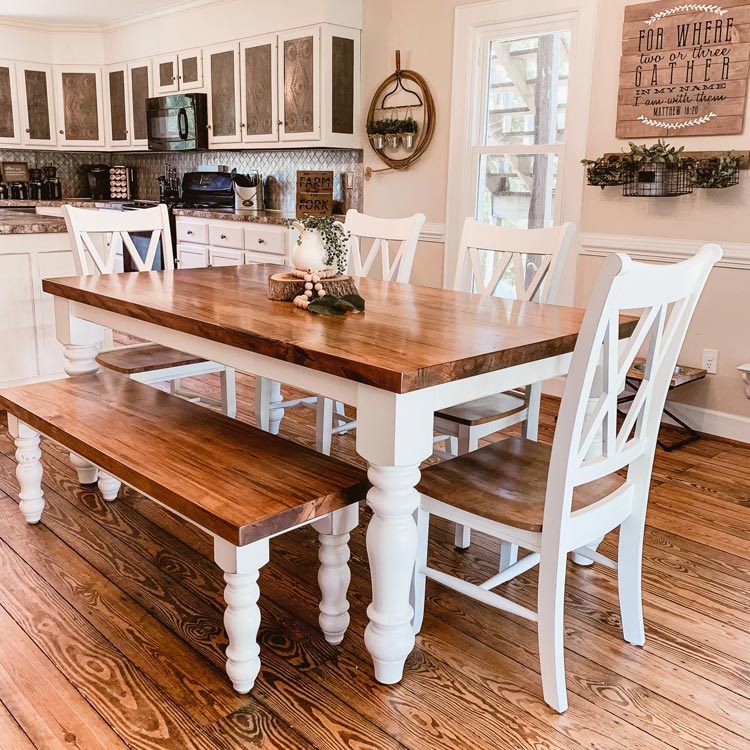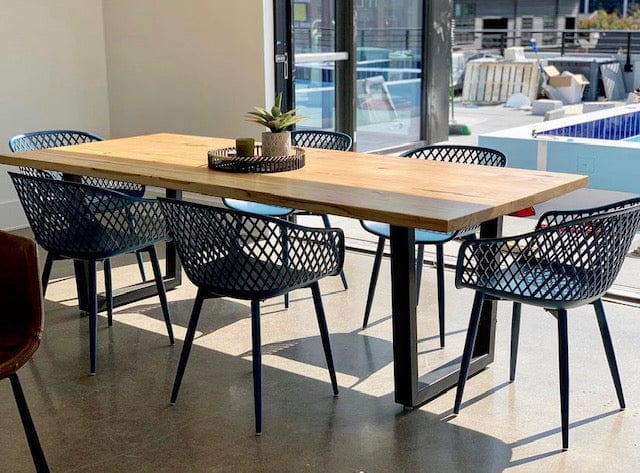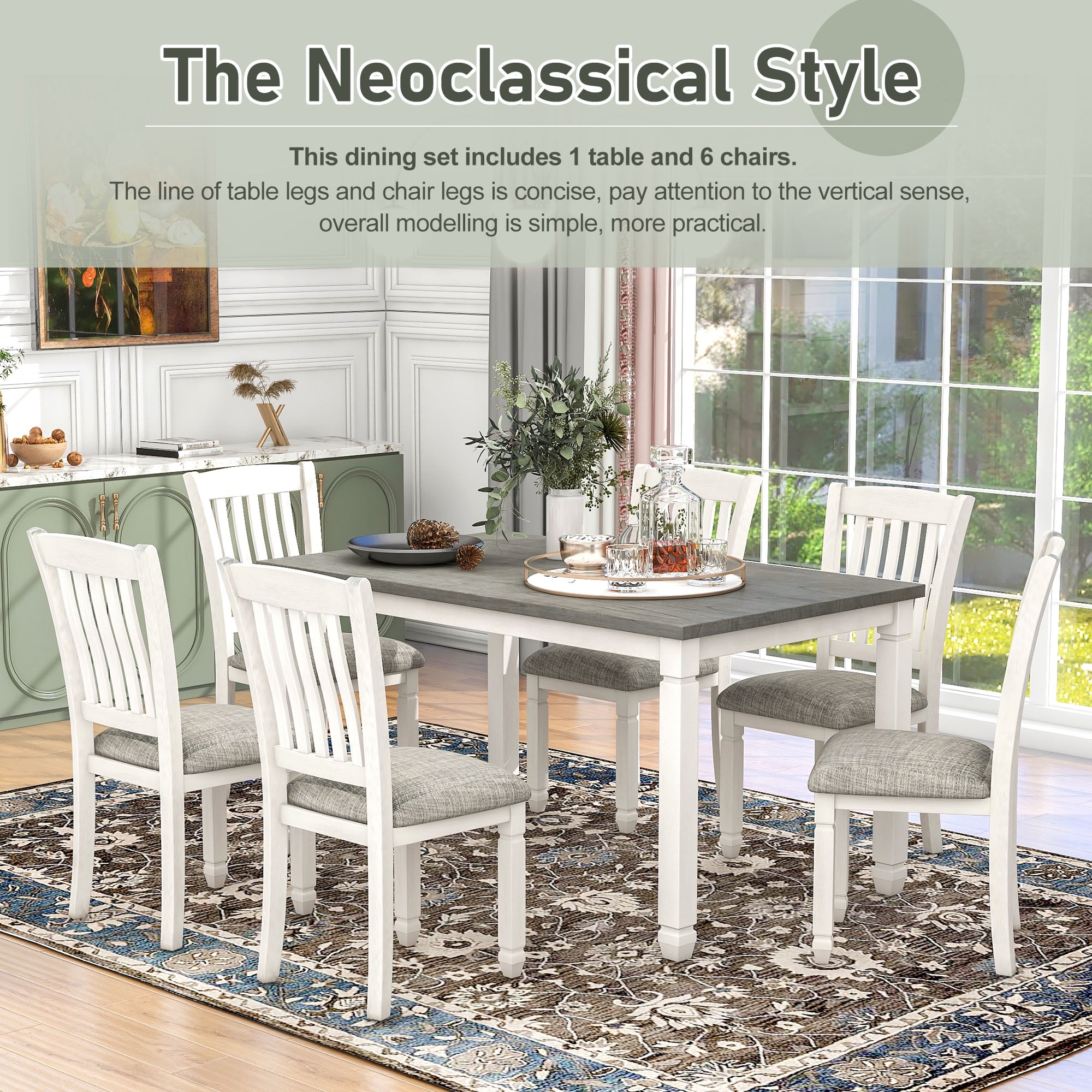Why Custom Dining Room Table Legs Are Worth the Investment
Why Custom Dining Room Table Legs Are Worth the Investment
Blog Article
Just How to Pick the Perfect Dining Area Table Legs for Your Home Decoration
Picking the ideal dining-room table legs is a nuanced procedure that calls for cautious consideration of numerous aspects, including your space restrictions, aesthetic choices, and useful requirements. The interplay in between products, dimensions, and designs can considerably influence the setting of your dining location, making it necessary to approach this decision systematically. As you contemplate the myriad options available, it ends up being clear that the ideal selection expands beyond mere appearance; it can improve your general eating experience. What elements should you focus on to ensure your choice complements your home's unique character?
Assess Your Eating Room
Evaluating your dining room is critical for selecting the right table legs that complement both aesthetics and performance. Begin by determining the measurements of your eating area, including ceiling elevation, floor area, and distance to other furnishings. This details will certainly aid establish the suitable size and elevation of your eating table, which straight affects the option of table legs.
Following, consider the design and layout of your eating space. An open-concept design may profit from table legs that provide aesthetic agility, such as slim metal or acrylic choices. Alternatively, an extra standard setup might call for strong wooden legs that provide a feeling of durability.
Evaluate the existing color scheme and materials in your dining area. Balancing the table legs with these components develops a cohesive look that improves the total decoration.
Inevitably, an extensive analysis of your dining room will assist you in making an educated decision, ensuring that your table legs not only enhance the visual charm yet also serve useful objectives.
Consider Your Style Preferences
When choosing dining-room table legs, it is important to review your personal design choices, as they substantially affect the total visual of your dining room. Your selection of table legs can either complement or comparison with existing décor, making it critical to align them with your favored interior decoration theme.
If your home leans in the direction of a modern visual, consider smooth metal or minimalist wood legs that provide a tidy, uncluttered appearance. For a much more typical strategy, luxuriant wood legs with detailed carvings can add a touch of elegance and sophistication. Industrial designs gain from durable, resources such as recovered timber and steel combinations, mirroring a sturdy appeal.
In addition, farmhouse and rustic designs usually favor tough, beefy legs that stimulate a feeling of heat and comfort. Conversely, if your décor is diverse, you may select non-traditional shapes or a mix of materials to produce aesthetic rate of interest.

Evaluate Material Options
The choice of material for eating space table legs plays a critical function in both resilience and aesthetic charm. Typical materials include timber, metal, and composite options, each offering distinct characteristics that can affect the overall look and durability of your table.
Timber is a traditional selection, known for its warmth and adaptability. Hardwoods like oak and walnut provide outstanding stamina and can be finished useful reference in numerous spots to match any decor. Softwoods like ache are extra susceptible to damages and scrapes, making them much less ideal for high-traffic locations.
Steel legs, commonly crafted from steel or light weight aluminum, exhibit modernity and commercial charm. They are resistant and highly long lasting to use, making them ideal for families with children or frequent celebrations (dining room table legs). In addition, steel can be completed in different colors, boosting the personalization possibilities
Composite products, such as MDF or laminate, deal affordability and diverse designs. While usually less long lasting than solid timber or steel, they can still offer a stylish appearance and are usually simple to keep.
Ultimately, the product you pick must align with your way of life, aesthetic choices, and the degree of usage your table will experience.
Determine Elevation and Size
Choosing the suitable height and size for your dining-room table is important for both functionality and comfort. The typical height for eating tables normally ranges from 28 to 30 inches, allowing adequate legroom for a lot of people when seated. Nonetheless, it is important to consider the dimensions of your dining space and the kinds of chairs you intend to utilize.

Moreover, consider the proportions of your dining-room. A larger table in a roomy area can produce a grand atmosphere, while a smaller sized table functions well in more intimate setups. Ultimately, the right height and size will integrate with your general style and improve the eating experience for you and your guests.
Explore Customization Possibilities

In addition, the style of the legs can be customized to fit various styles, such as rustic, modern-day, or industrial. For circumstances, tapered legs can stimulate a mid-century contemporary feel, while beefy, block-style legs may reverberate with typical or farmhouse style.
House owners can also check out shade coatings, from all-natural timber spots to repaint, enabling them to match or comparison with the table top and surrounding style.
Moreover, leg height can be adapted to accommodate details seating plans or individual choices, improving both comfort and capability.
Finally, unique embellishments, YOURURL.com such as carvings or attractive brackets, can better customize the table legs, making the dining experience not simply a meal yet a declaration item in the home. By taking into consideration these customization options, house owners can produce an eating space table that genuinely shows their individuality.
Final Thought
Selecting the perfect eating area table legs requires careful consideration of numerous elements, including the measurements of the eating area, design preferences, material resilience, and desired elevation. Modification choices even more enhance the capacity to accomplish a cohesive visual that complements the general design. By systematically evaluating these aspects, property owners can make sure that the chosen table legs not just satisfy practical needs however additionally add positively to the eating experience and setting of the home.
Selecting the ideal eating area table legs is go a nuanced procedure that requires cautious factor to consider of numerous aspects, including your room constraints, visual preferences, and practical demands.Assessing your eating space is critical for picking the right table legs that match both aesthetic appeals and capability.When identifying size, determine the location where the table will certainly be put to guarantee it fits comfortably, permitting for at the very least 36 inches of clearance around the table for very easy motion. A bigger table in a sizable location can develop a grand setting, while a smaller table works well in more intimate setups.Picking the optimal eating room table legs requires cautious consideration of different factors, including the dimensions of the dining room, design choices, material resilience, and preferred elevation.
Report this page